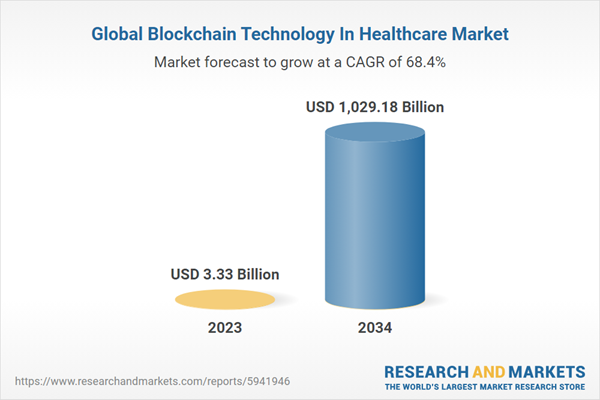|
Getting your Trinity Audio player ready...
|
A new study by Research and Markets has predicted a spike in the adoption rates of
blockchain technology in the healthcare industry, propelled by increasing use cases for the emerging technology.
The report, attempting to forecast the 10-year growth trajectory for blockchain in health, predicts that the technology will have a market share of $1,029.18 billion by 2034. Presently, blockchain’s market share in healthcare is pegged at $3.33 billion, with the report predicting a compound annual growth rate (CAGR) of 68.41% in under 10 years.

According to the report, key drivers for the growth include the skyrocketing demand for
improved healthcare data management in the face of rising security breaches. Other reasons for the hypothesis border on the need to explore modern technologies to combat the scourge of drug falsification and cryptography for healthcare wearable devices.
The report highlights the sizable market share controlled by publicly distributed ledgers over their private counterparts in healthcare. It predicts a steep rise in applications of private blockchain networks in healthcare in the coming years. Per the report, the growth spike will be buoyed by supply chain management needs in the ecosystem, requiring a secure and private system as an added layer of protection.
In terms of regional distribution, North America has a clear lead over other regions in terms of blockchain adoption in health. While Europe continues to drag its feet, Southeast Asia is emerging as a global powerhouse, underscored by its industry reliance on blockchain for medical record security and supply chain use cases.
The Middle East and Africa continue to trail global leaders, but a combination of government initiatives and private sector investment is expected to increase blockchain adoption in health outside finance.
“Supply chain management stands out as a significant application segment, driven by the escalating fight against drug counterfeiting and the incorporation of IoT interoperability,” according to the report. “Yet, clinical trials and eConsent are poised to grow at a swift pace, underpinned by an uptrend in blockchain adoption for data security and integrity.”
Blockchain and healthcare
Experts have been probing blockchain’s worthiness in healthcare since 2016, with the United Arab Emirates (UAE) famously rolling out a blockchain-based system for sharing healthcare data among medical personnel in the country.
In 2019, German-based Boehringer teamed up with Solve.Care to launch a first-of-its-kind blockchain-based care network for diabetic patients.
South Korea has warmed up to blockchain for healthcare with a cache of initiatives described as capable of boosting medical tourism in the country. In the wake of a bedbug infestation in the country, South Korean authorities have turned to the technology for real-time tracking of outbreaks, expanding on the use cases for the technology.
Watch: Breaking the misconception between ‘crypto’ & blockchain

 03-04-2026
03-04-2026 




